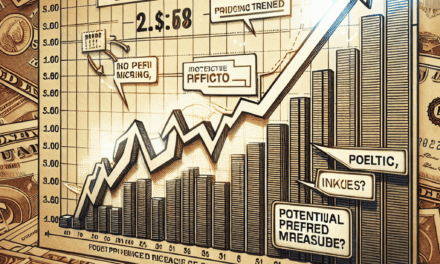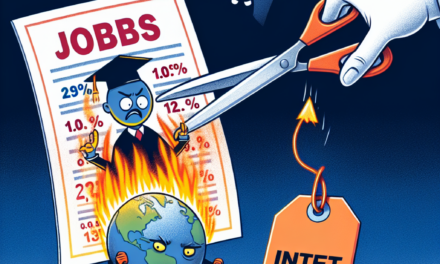“Strategic Pause: Warren Buffett’s Berkshire Prioritizes Prudence Over Purchases in Q3.”
Introduction
In the third quarter, Warren Buffett’s Berkshire Hathaway adopted a notably cautious approach by halting its stock purchases, reflecting a strategic pause amid uncertain market conditions. This decision underscores Buffett’s renowned investment philosophy of prudence and patience, especially during volatile periods. The move signals a potential reassessment of market valuations and opportunities, as Berkshire, known for its substantial equity investments, opts to conserve capital rather than pursue aggressive acquisitions. This cautious stance highlights Buffett’s long-term focus and his willingness to wait for more favorable conditions before deploying Berkshire’s significant cash reserves.
Understanding Warren Buffett’s Investment Philosophy: Why Caution Matters
Warren Buffett, often hailed as one of the most successful investors of all time, has long been known for his cautious and methodical approach to investing. This philosophy was once again evident in the third quarter of this year when Berkshire Hathaway, the conglomerate he leads, decided to halt its stock purchases. This move has sparked considerable interest and speculation among investors and analysts alike, prompting a closer examination of Buffett’s investment philosophy and the reasons behind this cautious stance.
To understand Buffett’s decision, it is essential to delve into the core principles that guide his investment strategy. At the heart of Buffett’s philosophy is the concept of value investing, which involves identifying undervalued companies with strong fundamentals and holding them for the long term. This approach requires a keen understanding of market dynamics and a disciplined patience to wait for the right opportunities. Buffett’s decision to pause stock purchases suggests that he may perceive the current market conditions as lacking in attractive investment opportunities that meet his stringent criteria.
Moreover, Buffett’s cautious approach is often informed by his awareness of broader economic trends and potential risks. The third quarter of this year has been marked by significant economic uncertainties, including fluctuating interest rates, geopolitical tensions, and concerns about inflation. These factors can create volatility in the stock market, making it challenging to accurately assess the intrinsic value of companies. By refraining from making new stock purchases, Buffett may be signaling his intent to avoid overpaying for assets in an overheated market, thereby protecting Berkshire Hathaway’s capital from potential downside risks.
In addition to market conditions, Buffett’s decision may also reflect his long-standing belief in maintaining a strong cash position. Holding substantial cash reserves provides Berkshire Hathaway with the flexibility to act swiftly when genuine opportunities arise, particularly during market downturns when asset prices are more likely to be undervalued. This strategy has served Buffett well in the past, allowing him to make significant acquisitions during periods of economic distress, such as the financial crisis of 2008.
Furthermore, Buffett’s cautious stance underscores the importance of patience in investing. In a world where rapid trading and short-term gains often dominate the financial landscape, Buffett’s approach serves as a reminder that successful investing is not about constant activity but rather about making informed decisions at the right time. By waiting for the right opportunities, Buffett exemplifies the virtue of patience, which is a cornerstone of his investment philosophy.
It is also worth noting that Buffett’s decision to halt stock purchases does not imply a lack of confidence in the long-term prospects of the market. Instead, it reflects his commitment to adhering to his investment principles, even when faced with pressure to conform to prevailing market trends. This steadfastness is a testament to his belief in the enduring value of disciplined investing.
In conclusion, Warren Buffett’s cautious stance in the third quarter serves as a powerful reminder of the importance of adhering to a well-defined investment philosophy. By prioritizing value, maintaining a strong cash position, and exercising patience, Buffett continues to navigate the complexities of the financial markets with prudence and foresight. As investors seek to understand and emulate his success, they would do well to appreciate the wisdom behind his cautious approach, recognizing that sometimes, the best course of action is to wait for the right opportunity to present itself.
The Impact of Economic Uncertainty on Berkshire Hathaway’s Investment Strategy
In the third quarter of 2023, Berkshire Hathaway, under the stewardship of Warren Buffett, made a notable decision to halt its stock purchases, a move that has sparked considerable discussion among investors and financial analysts. This decision comes amidst a backdrop of economic uncertainty, which has prompted many companies to reassess their investment strategies. Warren Buffett, often revered for his astute investment acumen, has historically been a proponent of seizing opportunities during market downturns. However, his recent cautious stance reflects a broader sentiment of prudence in the face of unpredictable economic conditions.
The global economic landscape has been fraught with challenges, including fluctuating interest rates, geopolitical tensions, and concerns over inflation. These factors have collectively contributed to a volatile market environment, making it increasingly difficult for investors to predict future trends with confidence. In such a climate, Buffett’s decision to pause stock purchases can be seen as a strategic move to mitigate risk. By holding off on new investments, Berkshire Hathaway is effectively preserving capital, allowing the conglomerate to maintain liquidity and flexibility. This approach ensures that the company is well-positioned to capitalize on more favorable opportunities when market conditions stabilize.
Moreover, this cautious approach aligns with Buffett’s long-standing investment philosophy, which emphasizes the importance of patience and discipline. Rather than succumbing to the pressure of short-term market fluctuations, Buffett has consistently advocated for a long-term perspective, focusing on the intrinsic value of investments. By refraining from stock purchases in the current quarter, Berkshire Hathaway is adhering to this philosophy, demonstrating a commitment to making informed and judicious investment decisions.
In addition to economic uncertainty, the decision to halt stock purchases may also be influenced by the performance of Berkshire Hathaway’s existing portfolio. The conglomerate’s diverse range of holdings, spanning various industries such as insurance, energy, and consumer goods, provides a buffer against market volatility. This diversification allows Berkshire Hathaway to weather economic storms more effectively than companies with a narrower focus. Consequently, the need for immediate stock acquisitions is less pressing, as the company can rely on its existing assets to generate steady returns.
Furthermore, the halt in stock purchases does not necessarily indicate a lack of confidence in the market’s long-term prospects. Instead, it underscores the importance of strategic timing in investment decisions. By waiting for more opportune moments to invest, Berkshire Hathaway can potentially achieve higher returns, maximizing shareholder value. This approach is particularly relevant in an era where market dynamics are increasingly influenced by external factors beyond the control of individual companies.
In conclusion, Warren Buffett’s decision to pause stock purchases in the third quarter of 2023 reflects a prudent response to the prevailing economic uncertainty. By prioritizing capital preservation and maintaining a long-term investment perspective, Berkshire Hathaway is positioning itself to navigate the challenges of a volatile market environment effectively. This cautious stance, while seemingly conservative, aligns with Buffett’s enduring investment principles and highlights the importance of strategic decision-making in times of economic unpredictability. As the global economy continues to evolve, Berkshire Hathaway’s approach serves as a reminder of the value of patience and discipline in achieving sustainable financial success.
Analyzing Market Conditions: What Led to Berkshire’s Decision to Halt Stock Purchases
In the third quarter of 2023, Berkshire Hathaway, under the stewardship of Warren Buffett, made the notable decision to halt its stock purchases, a move that has sparked considerable discussion among investors and market analysts. This decision, while surprising to some, is deeply rooted in the current market conditions and reflects Buffett’s cautious investment philosophy. To understand the rationale behind this strategic pause, it is essential to examine the prevailing economic environment and the factors influencing Berkshire’s investment strategy.
The global economic landscape in 2023 has been characterized by heightened volatility and uncertainty. Inflationary pressures have persisted, driven by supply chain disruptions and geopolitical tensions, which have, in turn, led to increased costs for businesses and consumers alike. Central banks around the world, including the Federal Reserve, have responded with interest rate hikes aimed at curbing inflation. However, these measures have also raised concerns about potential slowdowns in economic growth. In such a climate, the stock market has experienced significant fluctuations, with investors grappling with the dual challenges of inflation and rising interest rates.
Against this backdrop, Warren Buffett’s decision to halt stock purchases can be seen as a prudent response to the current market conditions. Historically, Buffett has been known for his value investing approach, seeking out undervalued companies with strong fundamentals and long-term growth potential. However, in a market characterized by uncertainty and inflated valuations, identifying such opportunities becomes increasingly challenging. By pausing stock purchases, Berkshire Hathaway is effectively exercising caution, avoiding the risk of overpaying for assets in a potentially overheated market.
Moreover, Buffett’s decision aligns with his long-standing investment philosophy of capital preservation. In times of market turbulence, maintaining a strong cash position allows Berkshire to remain agile and ready to capitalize on opportunities when valuations become more attractive. This approach not only mitigates risk but also positions the company to act decisively when the market environment stabilizes. By holding off on stock purchases, Berkshire is preserving its financial flexibility, ensuring that it can deploy capital effectively when the time is right.
Additionally, the decision to halt stock purchases may also reflect a broader strategic shift within Berkshire Hathaway. In recent years, the conglomerate has increasingly focused on diversifying its portfolio beyond traditional equity investments. This includes significant investments in infrastructure, renewable energy, and other sectors poised for long-term growth. By reallocating resources towards these areas, Berkshire is positioning itself to benefit from emerging trends and opportunities that align with its long-term vision.
In conclusion, Warren Buffett’s cautious stance in halting stock purchases during the third quarter of 2023 is a calculated response to the prevailing market conditions. By prioritizing capital preservation and maintaining financial flexibility, Berkshire Hathaway is navigating the current economic landscape with prudence and foresight. While this decision may have surprised some observers, it is consistent with Buffett’s value-driven investment philosophy and his commitment to long-term growth. As the market continues to evolve, Berkshire’s strategic pause underscores the importance of adaptability and patience in navigating uncertain times, ensuring that the company remains well-positioned to seize opportunities when they arise.
Warren Buffett’s Approach to Risk Management in Volatile Markets

Warren Buffett, the legendary investor and chairman of Berkshire Hathaway, has long been revered for his astute investment strategies and his ability to navigate the complexities of the financial markets. His approach to risk management, particularly during periods of volatility, offers valuable insights into the principles that guide his decision-making process. In the third quarter of this year, Berkshire Hathaway made the notable decision to halt stock purchases, a move that underscores Buffett’s cautious stance in the face of uncertain market conditions.
The decision to pause stock acquisitions is not one that Buffett takes lightly. Historically, he has been known to capitalize on market downturns, seizing opportunities to acquire undervalued assets. However, the current economic landscape presents a unique set of challenges that have prompted a more conservative approach. Rising interest rates, geopolitical tensions, and concerns about inflation have all contributed to heightened market volatility. In such an environment, Buffett’s decision to refrain from making new stock purchases reflects a prudent assessment of risk versus reward.
One of the key tenets of Buffett’s investment philosophy is the importance of maintaining a margin of safety. This principle involves investing in companies that are trading at a significant discount to their intrinsic value, thereby providing a cushion against potential losses. In the current market climate, identifying such opportunities has become increasingly difficult. Many stocks are trading at elevated valuations, driven by speculative fervor rather than fundamental strength. By choosing to sit on the sidelines, Buffett is effectively waiting for more favorable conditions that align with his value-oriented approach.
Moreover, Buffett’s cautious stance is indicative of his long-term perspective. Unlike many investors who may be swayed by short-term market fluctuations, Buffett remains focused on the bigger picture. He understands that market cycles are inevitable and that patience is a virtue in investing. By conserving capital and avoiding hasty decisions, he positions Berkshire Hathaway to take advantage of future opportunities when they arise. This disciplined approach not only mitigates risk but also ensures that the company is well-prepared to deploy its resources strategically.
In addition to his focus on value and long-term growth, Buffett’s decision-making is also influenced by macroeconomic factors. The current economic environment is characterized by uncertainty, with central banks around the world grappling with the challenge of balancing inflation control with economic growth. In such a scenario, Buffett’s decision to halt stock purchases can be seen as a reflection of his cautious outlook on the broader economy. By maintaining a strong cash position, Berkshire Hathaway retains the flexibility to respond to changing conditions and capitalize on opportunities that may emerge in the future.
Furthermore, Buffett’s approach to risk management is not solely about avoiding losses; it is also about preserving the financial health and stability of Berkshire Hathaway. By exercising restraint in volatile markets, he ensures that the company remains resilient and capable of weathering economic storms. This conservative strategy has served Berkshire well over the years, contributing to its reputation as a stalwart in the investment world.
In conclusion, Warren Buffett’s decision to halt stock purchases in the third quarter is a testament to his cautious approach to risk management in volatile markets. By prioritizing a margin of safety, maintaining a long-term perspective, and considering macroeconomic factors, Buffett exemplifies the principles that have made him one of the most successful investors of all time. As the financial landscape continues to evolve, his disciplined strategy serves as a reminder of the importance of prudence and patience in navigating the complexities of investing.
The Role of Cash Reserves in Berkshire Hathaway’s Financial Strategy
Warren Buffett, the legendary investor and CEO of Berkshire Hathaway, has long been known for his prudent investment strategies and his ability to navigate the complexities of the financial markets. In the third quarter of this year, Berkshire Hathaway made headlines by halting its stock purchases, a move that has sparked considerable interest and speculation among investors and analysts alike. This decision underscores the critical role that cash reserves play in Berkshire Hathaway’s financial strategy, reflecting Buffett’s cautious approach in uncertain economic times.
To understand the significance of this decision, it is essential to consider the broader context of Berkshire Hathaway’s investment philosophy. Buffett has always emphasized the importance of maintaining a strong cash position, which provides the company with the flexibility to seize opportunities as they arise. This approach is particularly relevant in volatile market conditions, where having substantial cash reserves can be a significant advantage. By halting stock purchases, Berkshire Hathaway is effectively preserving its cash reserves, ensuring that it remains well-positioned to capitalize on potential investment opportunities in the future.
Moreover, the decision to pause stock purchases aligns with Buffett’s long-standing belief in the value of patience and discipline in investing. Rather than rushing into the market when valuations are high or when economic conditions are uncertain, Buffett prefers to wait for the right opportunities to present themselves. This strategy has served Berkshire Hathaway well over the years, allowing the company to make strategic acquisitions and investments that have contributed to its long-term success. By maintaining a cautious stance, Berkshire Hathaway is adhering to its core investment principles, prioritizing long-term value creation over short-term gains.
In addition to providing flexibility, cash reserves also serve as a buffer against economic downturns and market volatility. In times of economic uncertainty, having a robust cash position can help a company weather financial storms and avoid the need to sell assets at unfavorable prices. This is particularly relevant in the current economic climate, where concerns about inflation, interest rates, and geopolitical tensions have created a challenging environment for investors. By preserving its cash reserves, Berkshire Hathaway is ensuring that it remains resilient in the face of potential economic headwinds.
Furthermore, the decision to halt stock purchases may also reflect Buffett’s assessment of the current market environment. With stock valuations at historically high levels, Buffett may be exercising caution to avoid overpaying for assets. This approach is consistent with his value investing philosophy, which emphasizes the importance of buying quality assets at reasonable prices. By waiting for more attractive valuations, Berkshire Hathaway is positioning itself to achieve better returns on its investments over the long term.
In conclusion, Warren Buffett’s decision to halt stock purchases in the third quarter highlights the pivotal role that cash reserves play in Berkshire Hathaway’s financial strategy. By maintaining a strong cash position, the company is preserving its flexibility, adhering to its core investment principles, and ensuring its resilience in uncertain economic times. This cautious approach reflects Buffett’s commitment to long-term value creation and his belief in the importance of patience and discipline in investing. As the financial landscape continues to evolve, Berkshire Hathaway’s strategy serves as a reminder of the enduring value of prudent financial management and the critical role that cash reserves play in navigating the complexities of the investment world.
Lessons from Warren Buffett: When to Hold Back on Stock Investments
Warren Buffett, often hailed as one of the most astute investors of our time, has long been a beacon of wisdom in the financial world. His investment strategies are scrutinized by both novice and seasoned investors alike, offering insights into the complexities of the stock market. Recently, Buffett’s conglomerate, Berkshire Hathaway, made headlines by halting stock purchases in the third quarter. This decision, while seemingly counterintuitive in a market that often rewards bold moves, underscores a fundamental lesson in investing: the importance of knowing when to hold back.
Buffett’s cautious stance is not without precedent. Historically, he has emphasized the value of patience and prudence, often advising investors to wait for the right opportunities rather than rushing into the market. This approach is rooted in his belief that the stock market, while offering potential for significant gains, is also fraught with risks that can lead to substantial losses if not navigated carefully. By pausing stock purchases, Buffett signals a need for vigilance, suggesting that the current market conditions may not align with his criteria for value investing.
The decision to halt stock purchases can be attributed to several factors. Firstly, the market’s volatility has been a cause for concern. Economic uncertainties, geopolitical tensions, and fluctuating interest rates have contributed to an unpredictable investment landscape. In such an environment, even seasoned investors like Buffett recognize the potential pitfalls of aggressive buying. By refraining from making new investments, Berkshire Hathaway is effectively mitigating risk, preserving capital for more opportune times.
Moreover, Buffett’s decision reflects a broader strategy of capital allocation. Rather than deploying resources into potentially overvalued stocks, Berkshire may be focusing on strengthening its existing portfolio and exploring alternative investment avenues. This approach aligns with Buffett’s long-standing philosophy of investing in businesses with strong fundamentals and sustainable competitive advantages. By prioritizing quality over quantity, he ensures that Berkshire’s investments are resilient in the face of market fluctuations.
Another lesson to glean from Buffett’s cautious approach is the importance of maintaining a long-term perspective. While short-term market movements can be tempting to act upon, Buffett’s strategy emphasizes the value of patience and foresight. By waiting for the right opportunities, investors can avoid the pitfalls of impulsive decisions driven by market hype or fear. This disciplined approach not only safeguards investments but also positions investors to capitalize on favorable conditions when they arise.
Furthermore, Buffett’s decision serves as a reminder of the significance of thorough research and analysis. Before making any investment, it is crucial to conduct a comprehensive evaluation of the market, industry trends, and individual company performance. This diligence ensures that investment decisions are informed and aligned with one’s financial goals and risk tolerance. By halting stock purchases, Buffett exemplifies the importance of due diligence, highlighting the need to base investment decisions on sound analysis rather than speculation.
In conclusion, Warren Buffett’s decision to halt stock purchases in the third quarter offers valuable lessons for investors. It underscores the importance of patience, risk management, and thorough analysis in navigating the complexities of the stock market. By adopting a cautious stance, Buffett not only preserves capital but also exemplifies the virtues of disciplined investing. As investors seek to emulate his success, they would do well to heed these lessons, recognizing that sometimes, the wisest course of action is to hold back and wait for the right opportunity.
The Long-Term Implications of Berkshire’s Q3 Investment Pause on Shareholders
In the third quarter of 2023, Berkshire Hathaway, under the stewardship of Warren Buffett, made the notable decision to halt its stock purchases, a move that has sparked considerable discussion among investors and analysts alike. This pause in activity is particularly intriguing given Buffett’s long-standing reputation for seizing opportunities in the stock market, especially during times of economic uncertainty. The decision to refrain from purchasing stocks raises questions about the long-term implications for Berkshire Hathaway’s shareholders and the broader investment community.
To understand the potential impact of this decision, it is essential to consider the context in which it was made. The global economic landscape has been marked by volatility, with inflationary pressures, geopolitical tensions, and fluctuating interest rates contributing to an environment of uncertainty. In such a climate, Buffett’s cautious approach may be seen as a prudent measure to safeguard Berkshire’s substantial cash reserves, which have historically provided the company with the flexibility to capitalize on lucrative opportunities when they arise. By holding back on stock purchases, Berkshire is effectively preserving its financial strength, allowing it to remain agile in the face of potential market downturns.
Moreover, this strategic pause may also reflect Buffett’s assessment of current market valuations. With stock prices reaching elevated levels in certain sectors, the legendary investor may be signaling his belief that the market is overvalued, thus warranting a more conservative approach. This perspective aligns with Buffett’s well-documented investment philosophy, which emphasizes intrinsic value and a margin of safety. By refraining from buying stocks at inflated prices, Berkshire is adhering to its disciplined investment strategy, which has consistently delivered long-term value to its shareholders.
For Berkshire’s shareholders, the implications of this decision are multifaceted. On one hand, the halt in stock purchases may lead to short-term concerns about the company’s growth prospects, as investors may question whether Berkshire is missing out on potential gains. However, it is crucial to recognize that Buffett’s track record of success is built on a foundation of patience and long-term thinking. By prioritizing financial stability and waiting for more favorable market conditions, Berkshire is positioning itself to take advantage of future opportunities that align with its investment criteria.
Furthermore, this cautious stance may also serve as a signal to the broader market, encouraging other investors to adopt a more measured approach in their own investment strategies. In an era where short-term gains often dominate the financial discourse, Buffett’s decision to pause stock purchases underscores the importance of maintaining a long-term perspective, even in the face of market exuberance.
In conclusion, while Berkshire Hathaway’s decision to halt stock purchases in the third quarter of 2023 may initially raise concerns among shareholders, it is essential to view this move within the broader context of Buffett’s investment philosophy and the current economic environment. By prioritizing financial stability and adhering to a disciplined approach, Berkshire is positioning itself to navigate future market challenges and capitalize on opportunities that align with its long-term objectives. For shareholders, this decision serves as a reminder of the enduring value of patience and prudence in the pursuit of sustainable growth. As the investment landscape continues to evolve, Buffett’s cautious stance may ultimately prove to be a wise strategy that benefits Berkshire and its shareholders in the years to come.
Q&A
1. **Why did Warren Buffett’s Berkshire Hathaway halt stock purchases in Q3?**
Berkshire Hathaway halted stock purchases in Q3 due to concerns about high market valuations and economic uncertainties.
2. **What is Warren Buffett’s investment philosophy that might explain this cautious stance?**
Warren Buffett’s investment philosophy emphasizes value investing, seeking undervalued stocks with strong fundamentals, which may not align with current market conditions.
3. **How does Berkshire Hathaway’s cash position reflect this cautious approach?**
Berkshire Hathaway’s cash reserves have increased, indicating a preference for liquidity over investing in potentially overvalued stocks.
4. **What impact does this decision have on Berkshire Hathaway’s portfolio?**
The decision to halt stock purchases may lead to a more conservative portfolio, focusing on existing holdings and maintaining cash reserves.
5. **How might this cautious stance affect investor perception of Berkshire Hathaway?**
Investors may view this cautious stance as a prudent move, reflecting Buffett’s long-term focus and risk management strategy.
6. **What sectors or industries might Berkshire Hathaway be avoiding with this halt in stock purchases?**
Berkshire Hathaway might be avoiding sectors with inflated valuations or those heavily impacted by economic uncertainties, such as tech or speculative growth stocks.
7. **Could this decision signal broader market concerns from Warren Buffett?**
Yes, this decision could signal broader market concerns, suggesting that Buffett sees potential risks or a lack of attractive investment opportunities in the current market environment.
Conclusion
Warren Buffett’s cautious stance, as evidenced by Berkshire Hathaway halting stock purchases in the third quarter, reflects a strategic pause in response to market conditions. This decision underscores Buffett’s prudent investment philosophy, prioritizing value and long-term growth over short-term gains. By refraining from new acquisitions, Berkshire may be signaling concerns about market valuations or economic uncertainties. This approach allows the conglomerate to preserve capital, maintain liquidity, and remain agile for future opportunities. Ultimately, Buffett’s restraint highlights his commitment to disciplined investing, ensuring that Berkshire is well-positioned to capitalize on favorable conditions when they arise.





